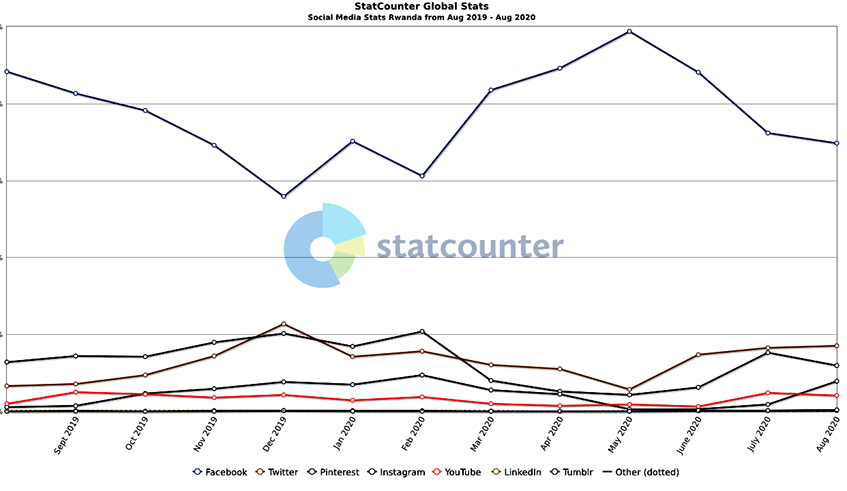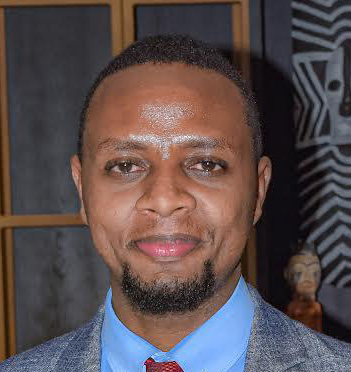Twitter, which has for long been known among elite populations such as chief executive officers, top government officials, and media personalities, is now considered the second most popular platform in Rwanda.


Millions of people globally use social media for communication, marketing, and transacting business. That is the case for thousands of people in Rwanda.
With the novel Coronavirus pandemic, digital life has never been more important. The outbreak pushed thousands of consumers, even those who were reluctant, to adopt social media platforms as a way of life.
Here’s a list of top 5 popular social networking platforms in Rwanda;
Facebook perhaps does not need any introduction given its scale of popularity among internet users. The platform, which allows people to communicate with each other, was started by American technology entrepreneur Mark Zuckerberg while he was a student at Harvard University, in early 2004.
TheFacebook, as it was then known, was originally intended to serve a digitised version of the ‘face books’ held by Harvard’s various colleges – paper directories containing images and personal information about students.
Facebook was initially limited to Harvard, it then expanded to include students at other top US universities, before being opened to all universities and high schools in the US and Canada. In 2006, it was finally decided to open the site up to the general.
Facebook dominates all other social networking platforms in Rwanda, controlling at least 62.66 per cent of the social media market size in the country, according to Ireland-based web analytics firm StatCounter.
In the last 12 months (August 2019-August 2020), the platform has been controlling the social media market in Rwanda, although the share reduced from 79.44 per cent perhaps due to the increased dominance of other platforms.
Maurice Baluku, who owns a media management firm in Kigali, says that just like Google as the entry point into the internet as a whole, Facebook has played the same role of being the entry point into the social media ecosystem.
"Due to this fact, the original users who are mostly millennial stuck with Facebook and drove word of mouth leading to its mass adoption,” he weighed in.
Any follow up platforms, such as Instagram, he added, have had to play catch up for most of their existence or have been swallowed up into Facebook’s overall ecosystem through acquisitions.
The messaging platform is not just popular in Rwanda, it is also the largest platform in the world with an estimated 2.7 million monthly users.
Twitter, which has for long been known among elite populations such as chief executive officers, top government officials, and media personalities, is now considered the second most popular platform in Rwanda.
According to StatCounter, the platform controls 15.35 per cent of the market from a mere 6 per cent in August last year.
As Baluku asserts, Twitter is mainly driven by the country’s leading influencers which are government top personalities and the agencies they head being on Twitter.
"This has led to great usage among ordinary users due to the need to stay in the loop with current affairs,” he noted. "This is also further fueled by the design of the platform which is focused on the ‘now now’.”
Pinterest, an American image sharing and social media platform, comes third among the most popular sites in Rwanda, controlling a 10.64 per cent of the entire social media market in the country.
One user told The New Times that consumers like her love Pinterest because of the abundance of ideas it gives in terms of fashion, interior design, food recipes, and hair styles.
"Basically everything in terms of lifestyle. It is one of the first apps that I download every time I get a new phone because not even Google can match it in terms of lifestyle content,” Grace Mbabazi said.
That’s probably why Pinterest saw a 39 per cent increase in global monthly active users between the first and second quarters of 2020, even though the company’s revenues dropped.
Instagram, another photo and video sharing social networking service owned by Facebook, is among the most popular platforms among local users with a 7 per cent social media market share.
The platform has not just grown in the user base in Rwanda it has also created a pool of influencers who are using their followership to generate revenues from advertising for companies and businesses.
Its significance can also be seen from a recent event in which President Paul Kagame hosted a live session with local Instagram top influencers, a conversation that focused on Rwanda’s 26-year journey after liberation.
Jackie Lumbasi, a Kenyan media personality currently working in Kigali, said in a separate interview with The New Times that gone are the days when mainstream media was the only way to communicate.
"This interaction is an indication of social media influencing being embraced. It also helps that some of us serve and communicate to the masses through both media,” she noted.
The prominence of Instagram in Rwanda can also be seen through how the pandemic has forced showbiz to shift to online. Most deejays and musicians took their entertainment shows to Instagram during the lockdown.
YouTube
There is probably no need to explain much about YouTube since it is a go-to platform when we need good music, TV shows, movies, or watching our favorite news and upcoming movies.
The platform is the fifth popular social media site in Rwanda with a 3.67 per cent market share.
In the last one or so years, the country has seen a rise of so-called televisions that operate on YouTube. A case in point is Isimbi TV, a verified local channel that posts popular entertainment shows on YouTube.
YouTube popularity in Rwanda grew from 1.78 per cent in August last year.


